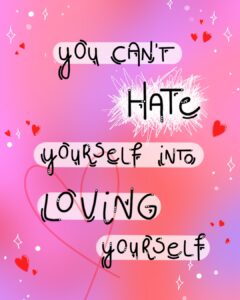Women should… How the obsession with expectations really harms us
Focusing on what you 'should' be doing might be hurting your mental health
Do you ever think: ‘I should be doing…’? Of course you do. We’re humans living in a capitalistic world of hyper-acceleration, meaning we’re constantly thinking about all the ways we could be more productive. Especially for women, the ‘shoulds’ are everywhere. But it turns out those ‘shoulds’ are actually pretty harmful.
Do you feel overwhelmed by your ‘shoulds’ too? Things like this happen slowly and tend to sneak up on you. The little ‘shoulds’ start popping up and slowly turn into a bigger pile of ‘have to’s’, only to change into a giant mess of ‘oh god, I can’t believe I haven’t done that yet’. Like messages in my inbox that were slowly accumulating, while I was thinking I would be able to reply some other time when I “had more time”.
Books I wanted to read were piling up on the shelf. My schoolwork, art, writing… Everything became an “on the side”-thing, something I did outside of ‘office hours’. Every day I would look at my notifications; a parade of red dots across the home screen of my phone. People I should be messaging, I should be replying to but did not.
Every day I looked at the books I should be reading.
Things I should be learning.
I looked at my computer and the subjects I wanted to write about: a little list I keep in my folders that reminds me of what I should be doing.
A vacation that I should be planning.
Appointments I should be making, people I should be calling; I was constantly thinking about the things I should be doing that I was not doing right now. It’s the feeling of wasting time.
The feeling of doing something that I should not be doing in that moment and thinking of all the things I should be doing instead.
Short summary for quick readers
- The feeling of 'should' is related to expectations that we put on ourselves: the feeling that we should be doing things that we're not doing. And those expectations can make us feel like failures.
- Especially for women, the 'shoulds' can pile up since we tend to not only take care of our own stuff, but also run households and families.
- Women have been sold this narrative through feminism that they can and should have it all. Even though it's physically impossible. But it will make us feel like failures if we can't live up to our own expectations.
- Women's mental health suffers from these constant expectations. Especially when we also expect ourselves to take it slow (I should take a break). There is always something else that we should be doing.
- It's important to be aware of the expectations we put on ourselves and catch it when we start 'shoulding' on ourselves.
- We need to stop punishing ourselves for not doing something. Redirect and write the 'shoulds' down instead of obsessing over them. That way you can re-evaluate and prioritize. Talk to a professional about expectations and take it easy on yourself.
* Free wallpaper download * Free wallpaper download * Free wallpaper download
* Free wallpaper download * Free wallpaper download * Free wallpaper download
The stress of ‘should’
And that feeling, the feeling of “shoulding”, causes tremendous amounts of stress. It is the feeling of being unproductive, of not taking responsibility. Of disappointing people and disappointing ourselves.
Like I said: it sneaks up on you unsuspectingly. One day you’re working and the next time you think about it, you realize you’ve missed important deadlines, forgot to respond to your messages and you haven’t talked to your friends in six months.
I was working on one important should: my work. Which then resulted in me not having time for all my other obligations. And unsurprisingly, when the things you should be doing start piling up while working on another thing that you should be doing, you get too preoccupied with the things you’re not able to do in that moment.
All I could think about is “I should be messaging my friends”. While I was drowning myself in the responsibility of work, the other things that I thought I should be doing took up all of the mental space available in my brain.
But that only results in a buildup of pressure.
The solution to this problem could be obvious for some: work less and free up more time for the things you love.
While yes, this is a solution, it does not solve the root problem. The root of the problem is the expectations that we put onto ourselves. That make us feel like failures when we don’t manage to do it all.
Even though the word ‘should’ makes it sound like an optional thing, we all know that the mere implication of that term almost always results in stress. Especially if it’s not followed by a shoulder shrug and a: ‘oh well’.
A lot of women should
We will always put ‘shoulds’ in every sentence about anything we think we need to be doing in that moment. It is not just a “this is what is on my to-do list for the day”, it’s an active: “what I’m doing right now is not what I actually should be doing and that needs to change”.
It implies priority. Hierarchy.
Saying “I should” tells you one thing: you aren’t doing what you actually should be doing and therefore your current action just isn’t good enough.
Especially for women, the ‘shoulds’ tend to pile up. Because we have a habit of running things for not only ourselves but also all the people living in close proximity to us. For women, the responsibility is always placed on us: we are the ones who need to stay in touch with the family, the neighbors, keep the house tidy, manage the kids’ lives – for a lot of women, the shoulds literally never end.
We always ‘should be calling our mom more often’ or we ‘should be cleaning the garage’. It implies that the things we are doing in that moment are not valuable. ‘I should be relaxing right now’ still implies that what we do is not enough. ‘I should be doing something right now’ implies that doing nothing is worthless.
We constantly judge ourselves for the things we’re doing and not doing.
And guess what? That’s worse when it comes to women’s shoulds.
Women can’t and shouldn’t “have it all”
As women, we have this constant craving for perfection, this feeling of “I’m a bad *insert role here* if I can’t keep up with *insert household chore here*”.
And it’s not that surprising: women are shamed for not doing it all. The famous “women can have it all”-line puts a tremendous amount of pressure on us.
It’s the “we all have the same 24 hours in a day as Beyoncé” lie that makes women feel guilty for not being literal super humans. Because the truth is: if you have to work a job, take care of the house, yourself and literally every member of your family, then you in fact need more than the 24 hours in a day. You need Beyoncé’s whole team to accomplish that task and still feel on top of it all.
The truth is: women cannot have it all.
And that might not sound very feminist. But the reality is that if you work a full-time job, you cannot be a full-time mom. That’s just not physically possible. And if you work a full-time job, you can’t be a part-time mom and be a full-time housekeeper.
Something has got to give.
And it’s not a sign of failure if it does.
Women should… throughout history
Back in the day, society made us believe that being a woman meant that we had to have a perfect house. Everything clean, everything in its place. If you couldn’t take care of the kids, dinner, your husband and keep the house looking spotless, then you weren’t a good wife or homemaker.
Then feminism came along and a lot of women got to do more than be a wife or homemaker. After World War II, plenty of women got a taste of work and when the opportunity arose for them to make a career, they happily took it.
But the conditioning of being a “good” wife and homemaker didn’t disappear. It was just combined with the conditioning of what it meant to be a “feminist woman”. Now, you were expected to be the perfect homemaker while simultaneously being shamed for not wanting more for yourself.
And that string of ‘shoulds’ is still going. Cause if you are a feminist woman who decides that she wants to stay at home to take care of a man, you’re not being ‘feminist’ enough. If you decide that you’re going to swear off men and focus on yourself, you’re being too ‘selfish’. If you want to vent about your partner whom you still love very much but who refuses to do the dishes, you should break up with him cause why are you letting him walk all over you like that?
Women’s history is filled with a constant stream of shoulds because we can never. actually. win.
There is always something we should be doing. And there’s always judgment for when we don’t show up in the right way.
Whether that’s us being a bad friend, wife, mother, sister, daughter, teacher, nurse – whatever it is that we do; we never do enough of it.
Women cannot have it all yet we are very much expected to.
Women’s ‘shoulds’ and mental health
Is it surprising that the percentage for burnout among women is higher than it is for men? (no, I’m not saying men don’t experience it, just that the percentage for women is higher)
Not really.
Our mental health is not only suffering from the feelings of shame that we ourselves and society puts on us, but it’s also suffering from the constant pressure we put on ourselves to always do more.
And the most interesting thing? We know all this.
Because when we’re doing too much, when we’re working and cleaning and making sure everything in the house runs smoothly, we think to ourselves “I really should take a break”.
Even when we’re doing the things that we have to be doing – the very things that will make sure we won’t feel shame – we know that we also have to worry about our health.
While working ourselves into burnout, we know that we’re doing it. And there’s nothing we can do about it. Because when we do rest, the constant stream of ‘shoulds’ pops back up in our mind.
It’s a very harmful vicious cycle that makes the rate with which women experience burnout, rise.
And the current state of the world isn’t helping either: the ‘shoulds’ now also include protesting, donating and other activities that will help make a change.
Because when it comes to the revolution, women are expected to be at the forefront too. Cause you don’t want them to think you don’t care, right? A real feminist stands up for what she believes in. Even if it kills her.
Easier said than done
This constant obsessions with what we should be doing is doing a number on us mentally.
Especially for those of us already struggling with mental health. Or the ones who are neurodivergent and don’t have the same spoons in a day to spend on our ‘shoulds’.
To not have these thoughts is definitely easier said than done, and as with all mental processes, it takes a lot of time and practice. I don’t have the golden ticket to fix this right now. I’m very much still struggling with this myself.
But I think, just like with everything, awareness is key.
And reading and learning about the ways that women are constantly ‘shoulding’ on themselves, might help with creating that awareness. Even if it’s only a little.
Once you start paying attention to it; when you start catching yourself whenever you think ‘I should be…’, you might be surprised. Notice how often you do it?
The one piece of advice I can give is: do not punish yourself for thinking in ‘shoulds’. Because if you start ‘shoulding’ your ‘shoulds’ (confusing, I know), you’ll dig yourself even deeper into that vicious cycle of shame and judgment.
Do not ‘should’ on yourself
So, just try to redirect. When you notice yourself thinking in ‘shoulds’, acknowledge and redirect. If you feel like you’re constantly overwhelmed with all the things you should be doing, write them down. Just to take them out of your mind.
That way, you can re-evaluate the list later and only do the things that are actually important.
If you feel like you can’t deal with the feelings of shame and judgment by yourself, then find a professional who might be able to help you figure it out.
And when you notice yourself thinking in what you’re lacking; the things you should be doing instead of what you’re doing right now, it is time to repeat the words of behavioral psychologist Albert Ellis:
‘Don’t should on yourself’.























